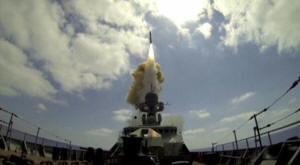|
Russian cruise missiles target Syria
 Send a link to a friend
Send a link to a friend
 [August 20, 2016]
BEIRUT/MOSCOW (Reuters) - Russian
warships in the Mediterranean Sea fired cruise missiles at targets near
Aleppo on Friday, a further sign of Moscow's broadening military effort
in Syria days after it began to fly bombing missions from an airbase in
Iran. [August 20, 2016]
BEIRUT/MOSCOW (Reuters) - Russian
warships in the Mediterranean Sea fired cruise missiles at targets near
Aleppo on Friday, a further sign of Moscow's broadening military effort
in Syria days after it began to fly bombing missions from an airbase in
Iran.
Russian air power had helped Syrian President Bashar al-Assad make
steady advances against rebels seeking to oust him since Moscow's
intervention a year ago, but a recent insurgent advance in Aleppo has
checked that momentum.
In northeastern Syria, warplanes from a U.S.-led coalition flew patrols
on Thursday to protect local ground forces they back against Syrian
government airstrikes that are targeting the Kurdish city of Hasaka, the
Pentagon said. [ID: nL1N1B00XH]
"The Syrian regime would be well advised not to interfere with coalition
forces or our partners," Pentagon spokesman Captain Jeff Davis said.
Russia's three cruise missile launches were its first against targets in
Syria from the Mediterranean, with previous ones made from its Caspian
Sea fleet. On Tuesday Russian bombers began flying missions in Syria
from Hamedan air base in Iran.
Russia's Defense Ministry said the strikes targeted the Islamist
militant group Jabhat Fatah al-Sham, known as the Nusra Front until it
broke formal ties with al Qaeda last month before playing a big role in
the sudden rebel advances in Aleppo.
The upsurge in fighting and airstrikes in and around the city, split
between government-held west and rebel-held eastern sectors, has
prompted growing international concern, galvanized by pictures on
Thursday of a dazed, bloodied child.
The plight of civilians in Aleppo has been aggravated in besieged areas
by dire shortages of basic goods, leading the World Food Programme to
warn of a "nightmarish" situation.

In Daraya, a suburb of Damascus, rebels and a war monitor said the
Syrian army's helicopters had dropped incendiary barrel bombs early on
Friday, putting the opposition-held town's only hospital out of action.
On Thursday Russia, Assad's most powerful military ally, said it
supported a proposal for a weekly 48-hour pause in fighting in Aleppo to
allow aid to reach the besieged areas and that it was ready to start the
first one next week.
On Friday, the main umbrella group for the Syrian opposition also
cautiously welcomed the idea provided the U.N. monitored the truce and
enforced compliance. During a previous humanitarian pause this year,
both sides complained the other had broken the truce as fighting
escalated again.
DOZENS KILLED IN HASAKA
On Friday Syrian Kurdish authorities evacuated thousands of civilians
from Kurdish areas of Hasaka following government air strikes, a
spokesman for the Kurdish YPG militia, an integral part of the
U.S.-backed Syrian Democratic Forces (SDF), said.
The SDF is at the heart of Washington's military campaign against
Islamic State group and last week seized the town of Manbij from the
militant organization, part of a growing swathe of northern Syria it
controls.
The U.S.-led coalition aircraft arrived at Hasaka as two Syrian SU-24s,
which had carried out the strikes, were leaving. "This is very unusual,
we have not seen the regime take this kind of action against YPG
before," the Pentagon's Davis said.
Hasaka is divided into zones of Kurdish and Syrian government control
and fighting between them has killed dozens of civilians in the past 48
hours, YPG spokesman Redur Xelil said.
The YPG and the government have mostly avoided confrontation during the
multi-sided war that has turned Syria into a patchwork of areas held by
the state and an array of armed factions.
The Syrian army said on Friday that this week's fighting was caused by
Kurdish security forces attempting to take over Hasaka, prompting it to
return fire on armed groups.
Assad, backed by Russia and Iran, has focused mostly on fighting Sunni
Arab rebels who have been battling to oust him in western Syria with
support from countries including Turkey, Saudi Arabia and the United
States.
[to top of second column] |

A still image, taken from video footage and released by Russia's
Defence Ministry on August 19, 2016, shows a rocket being launched
from a Russian corvette in the Mediterranean Sea at Jabhat Fateh
al-Sham militant targets in Syria, according to the ministry.
Ministry of Defence of the Russian Federation/Handout via Reuters

The YPG, or People's Protection Units, has meanwhile prioritized
carving out and safeguarding predominantly Kurdish regions of
northern Syria. The group has ties to Kurdistan Workers Party (PKK)
rebels in Turkey.
While the YPG controls most of the northeast, the Syrian government
has maintained footholds in the cities of Hasaka and Qamishli at the
border with Turkey.
The SDF seizure of Manbij from Islamic State last week raised the
prospect of possible advances towards al-Bab, near Aleppo.
Families of Islamic State fighters in al-Bab and another nearby
town, Jarablus, were evacuated to the militant group's stronghold of
Raqqa, the Syrian Observatory for Human Rights, a U.K.-based war
monitoring group, said.
ALEPPO TRUCE
Rebel groups, including Jabhat Fateh al-Sham, stormed a Syrian army
complex in southwest Aleppo two weeks ago, breaking a siege on
opposition-held parts of Aleppo and prompting fierce
counter-attacks.
A senior rebel commander said there was a "positive atmosphere"
surrounding talk of a ceasefire. "But so far there are no details."
Syrian warplanes had carried out 46 sorties in the last 24 hours,
including strikes in Aleppo that destroyed a tank, a vehicle loaded
with ammunition and three mortar emplacements, and killed dozens of
rebel fighters, a military source said.
Continuing clashes between rebels and the Syrian army and allied
militias were fiercest in the southwest of city, the Syrian
Observatory for Human Rights, a U.K.-based monitor of the
five-year-old civil war, said on Friday.
It added that air strikes and shelling in and around Aleppo had
killed 422 civilians, including 142 children, this month.
"We need a 48-hour pause, we need it now," WFP spokeswoman Bettina
Luescher told a briefing in Geneva on Friday. While the rebel
advance this month opened a narrow corridor into opposition-held
areas of Aleppo, access remains very limited and dangerous, meaning
aid supplies are scarce.
"It's crucially important that we go in there because people are
absolutely desperate," Luescher added. "From both sides, these
sieges have to stop - it's inhumane, awful, disgusting, nightmarish.
Not necessarily U.N. words, but that's what it is."
(Reporting by Angus McDowall and Tom Perry in Beirut, Polina Devitt
in Moscow, Stephanie Nebehay in Geneva; editing by Ralph Boulton and
Richard Balmforth)
[© 2016 Thomson Reuters. All rights
reserved.]
Copyright 2016 Reuters. All rights reserved. This material may not be published,
broadcast, rewritten or redistributed.

 |